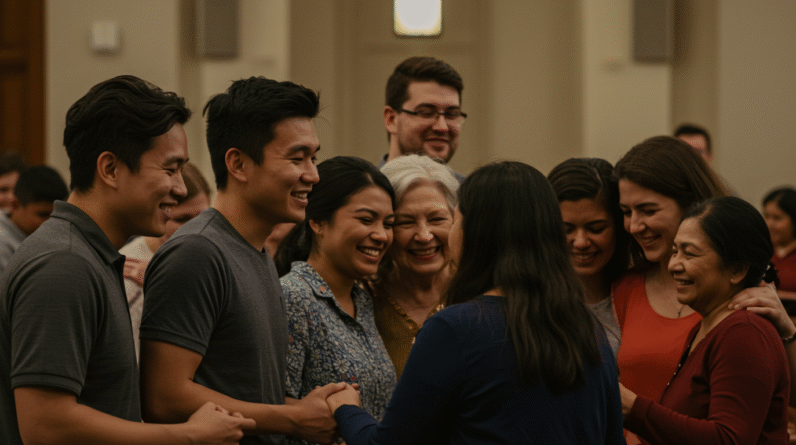How Fellowship Strengthens Your Walk With God
You probably already know that your faith isn’t meant to be lived out in isolation. Christian life is inherently communal, and the Bible makes that clear. When you engage in Fellowship in the Church, you step into a rhythm that shapes how you pray, grow, serve, and persevere. This article walks you through why fellowship matters, how it changes your daily walk with God, and practical ways to cultivate it in your life. Expect Scripture-backed insights, practical guidance, and encouragement to lean into the community God provides.
Why Fellowship Is Both a Command and a Blessing
The Bible doesn’t present fellowship as optional. You’re called into community because God designed spiritual growth to happen through relationships. Fellowship is both a command—something you’re to pursue—and a blessing—an overflow of God’s grace in your life. When you commit to Fellowship in the Church, you position yourself to receive encouragement, correction, and help in ways a solitary walk rarely provides.
The early church model shows you how this plays out. In Acts, believers devoted themselves to teaching, fellowship, breaking of bread, and prayer. That wasn’t a passive setup; it was an intentional, communal lifestyle that resulted in spiritual growth and influence Acts 2:42-47.
Fellowship in the Church: What the New Testament Teaches
When you look at the New Testament, you see a repeated emphasis on mutual life. Fellowship is presented as central to Christian identity—not an optional extra. Scripture highlights how believers are one body, interconnected and interdependent, called to care for one another and to grow together.
Paul tells you that Christians are many parts of one body, each with different functions but all necessary Romans 12:4-5. You don’t get to pick and choose whether that applies to you; the metaphor implies dependency. Hebrews urges you not to neglect meeting together because consistent gathering fuels encouragement and steadfastness in faith Hebrews 10:24-25.
Fellowship and the Example of Jesus
Jesus modeled a life of community. He walked, ate, taught, and prayed with a group of followers. His command to love one another framed the Christian community as a place where love is visible and active John 13:34-35. When you embrace Fellowship in the Church, you participate in the very pattern Jesus established—mutual love that witnesses to the world.
Jesus also promised that when two or three gather in His name, He is present among them, which shows that community draws you into an awareness of Christ’s nearness in a unique way Matthew 18:20.
Fellowship as an Expression of New Life
Your conversion alters your relationship with others. When you become a follower of Christ, you’re brought into communion with God and with fellow believers. John states that fellowship with the Father and the Son naturally produces fellowship with other believers 1 John 1:3.
This is more than socializing; it’s sharing in the spiritual realities of repentance, forgiveness, and the life of Christ. Fellowship in the Church is proof of your new identity in Christ—visible and incarnational.
Spiritual Growth Happens in Community
You can read Scripture alone, pray privately, and worship in quiet devotion, but growth is often accelerated and deepened through community. The body life described in Ephesians shows you that spiritual maturity is a corporate work: leaders equip the saints so the whole body grows up in love and truth Ephesians 4:11-16.
When you participate in Fellowship in the Church, you receive teaching, accountability, encouragement, and correction. These are essential for moving from spiritual infancy to maturity.
Accountability: The Hidden Strength of Fellowship
Accountability is one of the most practical ways fellowship strengthens your walk with God. You’re less likely to drift into sin, complacency, or shallow faith when others know you and care enough to speak into your life. Galatians instructs you to carry one another’s burdens, which includes the hard work of confronting sin and restoring a brother or sister gently Galatians 6:2.
When accountability is rooted in love and humility rather than judgment, it becomes a powerful tool for sanctification. You’ll find that your spiritual disciplines deepen when others walk alongside you.
Encouragement in Suffering and Trial
Life brings trials. Fellowship in the Church multiplies joy but also divides sorrow. When you suffer, you often need more than private prayer—you need presence, practical help, and prayers from fellow believers. Scripture tells you to rejoice with those who rejoice and mourn with those who mourn, demonstrating how emotional life is shared in community Romans 12:15.
The Acts church provides a picture of believers sharing resources, so no one was left in need Acts 4:32-35. You see how fellowship practically supports endurance in hard seasons.
Worship and Sacrament as Community Acts
Corporate worship and sacraments like communion are not private acts repackaged for the public. They are communal rituals that shape your identity and reinforce gospel realities. Celebrating the Lord’s Supper together reminds you that you belong to a body joined by Christ’s sacrifice 1 Corinthians 11:23-26.
When you worship with others, you’re participating in a story larger than yourself. Fellowship in the Church turns personal faith into shared praise and remembrance.
Service and Mission Rooted in Community
Fellowship fuels mission. When you gather, gifts are discovered, leadership formed, and ministries born. Paul’s teaching about different gifts in the body shows that community is the context for every believer to contribute and for the church to function as Christ’s hands and feet 1 Corinthians 12:12-27.
Being part of Fellowship in the Church means you’re not only receiving; you’re serving, giving, and advancing the gospel alongside others. The collective witness of a devoted community is powerful and effective.
Fellowship and Spiritual Disciplines
Your private spiritual disciplines—Bible reading, prayer, fasting—are vital. But Fellowship in the Church amplifies these practices. Group Bible studies sharpen interpretation and application, corporate prayer mobilizes intercession, and shared fasting fosters spiritual focus.
Jesus’ model of praying together and the New Testament’s emphasis on communal devotion show you that spiritual disciplines have a corporate dimension. When you practice disciplines together, you build rhythms that sustain your personal walk with God.
Hospitality and Everyday Fellowship
Fellowship isn’t confined to church buildings or scheduled meetings. Hospitality—opening your home and life to others—is a biblical expression of community. Paul urges believers to practice hospitality without grumbling 1 Peter 4:9.
When you invite others into your life, you create space for relationships, mentorship, and mutual care. Fellowship in the Church is as much about meals, conversations, and shared life as it is about formal gatherings.

Small Groups: The Engine of Deepening Fellowship
Small groups often provide the best environment for growth. In smaller settings, you can be vulnerable, confess struggles, and receive prayer in ways that are harder in large gatherings. Hebrews’ admonition to encourage one another is particularly relevant in small-group contexts Hebrews 3:13.
If you’re looking to deepen your walk with God, joining or starting a small group focused on Scripture, prayer, and mutual care can be transformative. Fellowship in the Church thrives at this scale because it allows relationships to mature.
The Role of Teaching and Preaching in Community Life
Sound teaching within the Fellowship in the Church matters. You need truth taught in the community to build a shared understanding of Scripture that shapes beliefs and practices. Paul’s charge to Timothy to entrust sound teaching to faithful men underscores the importance of doctrinal clarity in the life of the church 2 Timothy 2:2.
Community teaching aligns individual lives around gospel truths and provides a collective framework for living out your faith.
Conflict and Church Discipline: Hard but Necessary
Fellowship isn’t always easy. Disagreements, sin, and brokenness show up in every community. Jesus gave instructions for addressing conflict among believers, showing you that relational repair is part of loving one another Matthew 18:15-17.
Church discipline, when practiced with grace and restoration in view, protects communal health and encourages repentance. Fellowship in the Church includes the hard work of confronting sin lovingly to restore individuals and preserve the integrity of the body.
Diversity and Unity: Living with Differences
Church communities are diverse—culturally, socioeconomically, and theologically. Paul’s image of one body with many parts demands that you learn how to live with differences while holding to unity in essentials Ephesians 4:3-6.
Fellowship in the Church helps you practice love that transcends preferences and favors humility over pride. Unity doesn’t mean uniformity; it means you find common ground in Christ while honoring different expressions of faith.
Generosity and Resource Sharing
Community teaches you how to use resources for kingdom purposes. Acts depicts believers sharing possessions and meeting needs, demonstrating that Fellowship in the Church naturally moves toward generosity Acts 4:34-35.
When you join a community that values generosity, you’re participating in a pattern that blesses the poor, supports ministry, and fosters trust among members.
Mentoring and Discipleship in Community
Discipleship is rarely a solo venture. Paul modeled mentoring when he invested in Timothy and Titus, showing you the value of relational teaching and modeling 2 Timothy 1:2; Titus 1:4, and https://www.biblegateway.com/passage/?search=Titus+1:4&version=NIV. Fellowship in the Church forms the context for these intergenerational relationships where wisdom and faith are passed on.
When you intentionally mentor and are mentored, your walk with God gains stability and direction.
Prayer: Corporate Power and Personal Participation
Corporate prayer is one of the most potent expressions of Fellowship in the Church. James teaches that the prayer of a righteous person is powerful and effective; multiplied by a praying community, spiritual impact grows James 5:16.
When you pray with others, you not only bring requests before God but also learn to intercede, trust, and submit to God’s wisdom together. Community prayer strengthens your faith because you’re reminded that you’re not alone in petitioning God.
The Witness of a Unified Community
Jesus said the world would recognize His disciples by their love for one another. Fellowship in the Church is therefore an evangelistic witness. When you live in genuine unity and love, you display the gospel in a way words alone cannot John 17:20-23.
Your fellowship will attract others and open doors for gospel conversations, making community a central means of mission.
Practical Steps to Cultivate Fellowship
If you want to strengthen your walk with God through Fellowship in the Church, here are practical steps to consider:
- Prioritize consistent gathering—both large and small settings.
- Join or form a small group focused on Scripture and prayer.
- Practice hospitality by inviting people into your life.
- Serve with your gifts to build ministry and trust.
- Seek mentorship and offer guidance to others.
- Engage in corporate prayer and worship intentionally.
These steps aren’t exhaustive but provide a framework for building a deeper communal life that supports spiritual growth.
Overcoming Barriers to Fellowship
You may face obstacles: busyness, past hurts, distrust, or theological differences. These are real, but not insurmountable. Start small, be honest about struggles, and look for communities that prioritize grace and truth. Hebrews encourages you not to give up meeting together; persistence often breaks down barriers Hebrews 10:25.
Forgiveness and patience are essential. When you accept that no church is perfect but all are a work in progress, Fellowship in the Church becomes increasingly accessible.
When Community Hurts: Seeking Restoration
If you’ve been hurt by the church or community, you have to heal before fully re-engaging. Seek pastoral care, trusted mentors, and perhaps professional counseling. Scripture calls for restoration done gently and purposefully, aiming for repentance and reconciliation Galatians 6:1.
Healing doesn’t mean ignoring pain; it means working through it with God and others so you can participate in healthy fellowship again.
Measuring Growth Through Community Life
You can measure spiritual growth in part by how your community shapes you. Signs include increased humility, service, love for others, and a commitment to truth. Paul’s description of the fruit of the Spirit gives you observable markers of growth that are often cultivated in community Galatians 5:22-23.
If you notice these fruits growing in you and in your fellowship, you’re seeing how communal faith formation strengthens your walk with God.
Stories That Illustrate the Power of Fellowship
History and modern testimonies are full of examples where Fellowship in the Church transformed lives. Consider early Christian communities that, through shared life, survived persecution and spread the gospel widely. In your context, you might have friends who credit a small group or church family with sustaining them through grief, addiction recovery, or vocational crises. These stories demonstrate that when believers bind together, they create conditions for resilience, repentance, and spiritual breakthrough.
Hearing and sharing such testimonies encourages you to invest in community because you can see tangible evidence of God’s work through fellowship.
Leadership’s Role in Nurturing Fellowship
Leaders set the tone for community health. Pastors and elders are called to equip and foster environments where Fellowship in the Church flourishes. Paul’s pastoral letters instruct leaders to shepherd the flock, protect truth, and model holiness 1 Peter 5:2-3.
When leadership prioritizes discipleship, accountability, and grace, you’re more likely to find a community that strengthens your faith.
Technology and Fellowship: Opportunities and Pitfalls
Technology gives you new ways to do Fellowship in the Church—online groups, virtual prayer meetings, and resources for growth. These tools can expand the community, especially when physical gathering isn’t possible. However, digital connections shouldn’t replace embodied relationships. Scripture’s emphasis on meeting together means you should use technology as a supplement rather than a substitute Hebrews 10:24-25.
Balance is key: leverage tech for outreach and connection, but prioritize in-person engagement when possible.
Living Out Fellowship Daily
Fellowship isn’t an event; it’s a way of life. You practice it in daily conversations, shared meals, mutual aid, and spiritual partnership. Colossians encourages you to clothe yourself with compassion, kindness, humility, gentleness, and patience—the very traits that make daily fellowship possible Colossians 3:12-14.
When you embed these virtues into daily life, your fellowship becomes a constant means of grace, shaping your character and your walk with God.
Final Encouragement: Step Into Community
If you’re reading this and feeling the nudge to connect, act on it. Start by attending a meeting, joining a small group, or inviting someone for coffee. Fellowship in the Church may require vulnerability, time, and sacrifice, but the payoff is spiritual growth, comfort in trials, and a lived-out gospel that shapes you and your community.
Remember Jesus’ words: when you love one another, the world will know you belong to Him John 13:35. Your walk with God will be strengthened by the people He places around you—so take the step to invest in fellowship today.
Explore More
For further reading and encouragement, check out these posts:
👉 7 Bible Verses About Faith in Hard Times
👉 Job’s Faith: What We Can Learn From His Trials
👉 How To Trust God When Everything Falls Apart
👉 Why God Allows Suffering – A Biblical Perspective
👉 Faith Over Fear: How To Stand Strong In Uncertain Seasons
👉 How To Encourage Someone Struggling With Their Faith
👉 5 Prayers for Strength When You’re Feeling Weak

📘 Jesus and the Woman Caught in Adultery – Grace and Mercy Over Judgement
A powerful retelling of John 8:1-11. This book brings to life the depth of forgiveness, mercy, and God’s unwavering love.
👉 Check it now on Amazon
🌍 “Every great message deserves a home online.”
Don’t let your calling stay hidden. Start a Christian Blog/Website using Hostinger — with 99.9% uptime, free domain, and SSL, your voice can shine for God’s glory anytime, anywhere.
👉 Begin today. Try it RISK-FREE!
“Your body is God’s temple — care for it with purpose.”
Renew your energy and restore balance the natural way. Mitolyn helps support a healthy metabolism, giving you the vitality to live out God’s calling with strength and confidence.
🌿 Unlock Your Metabolic Power. Burn More Calories & Feel Great With Mitolyn.
👉 Start Today. Check Price Now.
As a ClickBank & Amazon Affiliate, I earn from qualifying purchases.
Acknowledgment: All Bible verses referenced in this article were accessed via Bible Gateway (or Bible Hub).
“Want to explore more? Check out our latest post on Why Jesus? and discover the life-changing truth of the Gospel!”






